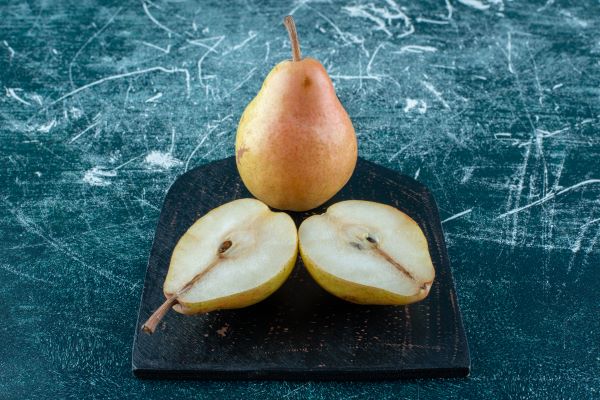In the quest for optimal health for our canine companions, including fruits in their diet is a pivotal consideration. Fruits, with their rich array of vitamins, minerals, and fiber, offer a natural remedy for digestive issues, enhancing the overall well-being of dogs. While not all fruits are safe for canine consumption, select varieties can significantly improve stomach health, contributing to a happier, more vibrant pet. This article delves into seven magnificent fruits that are safe for dogs and are also known to aid in their digestive health. From the fibrous pumpkin to the hydrating watermelon, each fruit presents unique benefits and practical feeding tips to seamlessly incorporate these nutritious snacks into your dog’s diet.
Pumpkin

Pumpkin stands out as a superfood for dogs, primarily due to its high fiber content, which can alleviate digestive issues such as diarrhea and constipation. This orange-hued vegetable is rich in vitamins A, C, and E, along with potassium and iron, all of which contribute to a dog’s health by boosting the immune system, improving skin and coat health, and supporting eye health. Incorporating pumpkin into a dog’s diet can thus not only aid in digestive health but enhance overall well-being.
When introducing pumpkin to your dog, opt for plain, cooked pumpkin without added sugars or spices. While a canned pure pumpkin is convenient, ensure it is 100% pumpkin with no additives. It is advisable to start with small amounts to gauge your dog’s tolerance. As a guideline, a teaspoon per day for small dogs and a tablespoon for larger breeds can be a safe starting point. While pumpkin is beneficial, it should complement a balanced diet rather than replace main meals.
Apple

Apples offer a sweet, crunchy dog treat with many nutritional benefits. They are a good source of vitamins A and C, as well as fiber, which aids in maintaining a dog’s digestive health. Additionally, apples can help clean residue off a dog’s teeth, contributing to better oral health. However, removing the seeds and core before feeding is important, as apple seeds contain cyanide, which can harm dogs in large quantities.
With their sugar content, apples should be fed to dogs in moderation. A few apple slices make a healthy snack that most dogs find irresistible. For an added twist, apples can be frozen for a refreshing summer treat or mixed into food as a sweet addition. Always observe your dog’s reaction to new foods, and consult with a veterinarian if you’re unsure about the appropriate portion sizes for your dog’s size and dietary needs.
Banana

Bananas are a great source of potassium, vitamins, biotin, fiber, and copper. They offer various health benefits for dogs, including improved gastrointestinal health and replenished electrolytes. Their natural sweetness makes them a favored treat among many dogs, providing a healthy alternative to fatty or sugary snacks. Despite their benefits, bananas are high in sugar and should be given in moderation, primarily serving as an occasional treat rather than a staple in a dog’s diet.
Introducing bananas to your dog’s diet should be done gradually, with small portions to avoid any potential stomach upset. A few slices of banana can be a rewarding treat after a walk or a training session, offering a boost in nutrients and a bonding moment between pet and owner. Mixing bananas with a dog’s regular food or freezing them as a summer snack can add variety to their diet while keeping it nutritionally beneficial.
Blueberries

Blueberries are renowned for their antioxidant properties, which can significantly benefit humans and our canine friends. These small but mighty fruits are packed with vitamins C and K, fiber, and phytochemicals, which can help fight diseases and improve dogs’ overall health. The antioxidants in blueberries are especially beneficial for senior dogs, as they can help reduce the effects of brain aging, thereby supporting cognitive function.
Incorporating blueberries into your dog’s diet is relatively simple, thanks to their small size and palatability. They can be given as a fresh treat or frozen for a crunchy snack, especially during warmer months. However, as with all treats, it’s important to feed blueberries in moderation, considering your dog’s size and dietary needs. They make a great low-calorie treat for training, easily fitting into a balanced diet without contributing to weight gain.
Watermelon

Watermelon is a hydrating fruit comprising approximately 92% water, making it an excellent choice for keeping your dog hydrated, especially during hot weather. Besides its high water content, watermelon is a good source of vitamins A, B6, and C and dietary fiber, aiding digestion. Its sweetness provides a flavor most dogs enjoy, while its low-calorie count ensures it doesn’t disrupt a healthy diet.
When feeding your dog watermelon, removing all seeds and the rind is crucial to prevent potential health issues, such as intestinal blockage or upset stomach. Small, manageable pieces of seedless watermelon flesh can be a refreshing treat. Like any other new food, this fruit should be introduced slowly into a dog’s diet to monitor for adverse reactions and ensure it agrees with their digestive system.
Pear

Pears are another excellent fruit choice for dogs, offering a rich source of vitamin C, fiber, and copper. These nutrients support the immune system, improve digestive health, and contribute to your pet’s overall well-being. The fiber in pears can particularly aid in maintaining regular bowel movements and preventing constipation in dogs.
Before introducing pears to your dog, remove the core and seeds, which can be harmful, and cut the fruit into appropriate-sized slices to avoid choking hazards. Fresh, ripe pears are preferred over canned varieties, which often contain added sugars or syrups. As always, moderation is key, and pears should be given as a treat rather than a major component of your dog’s diet. Observing your dog after introducing new foods is essential to ensure they are well tolerated.
Cantaloupe

Cantaloupe is a low-calorie fruit rich in vitamins A and C, which are important for immune function and skin health. Its high water and fiber content also makes it ideal for aiding in hydration and digestion. Given its sweet taste, cantaloupe can be an appealing dog treat, offering a healthy alternative to processed treats.
When feeding your dog cantaloupe, removing the rind is important to prevent gastrointestinal distress. Small, bite-sized pieces are ideal to ensure easy consumption and digestion. Due to its sugar content, cantaloupe should be given in moderation, particularly for overweight or diabetic dogs. As with any new addition to your dog’s diet, start with small amounts to monitor for adverse reactions.
Final Thoughts
Incorporating fruits into your dog’s diet offers a myriad of health benefits, particularly when it comes to digestive health. The seven fruits discussed—pumpkin, apple, banana, blueberries, watermelon, pear, and cantaloupe—provide essential nutrients, variety, and enjoyment to your dog’s diet. However, it’s crucial to introduce these fruits slowly and in moderation, ensuring they are prepared safely without seeds or rinds that could pose health risks. Always consult your veterinarian before significantly changing your dog’s diet, especially if they have specific health issues or dietary needs. By mindful inclusion of these fruits, you can contribute to your furry friend’s happier, healthier life.


